外研版(2019) 选择性必修第一册 Unit 1 Laugh out Loud! Developing ideas 课件(35张)
文档属性
| 名称 | 外研版(2019) 选择性必修第一册 Unit 1 Laugh out Loud! Developing ideas 课件(35张) | 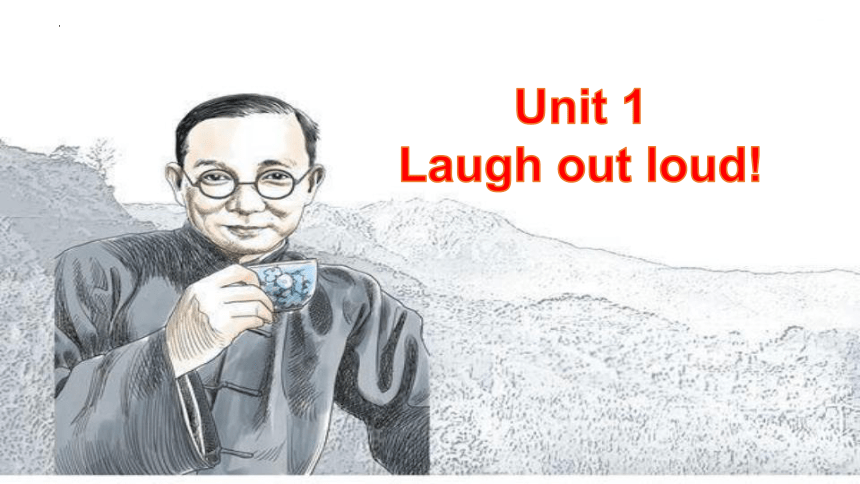 | |
| 格式 | pptx | ||
| 文件大小 | 7.7MB | ||
| 资源类型 | 教案 | ||
| 版本资源 | 外研版(2019) | ||
| 科目 | 英语 | ||
| 更新时间 | 2022-09-19 22:29:08 | ||
图片预览


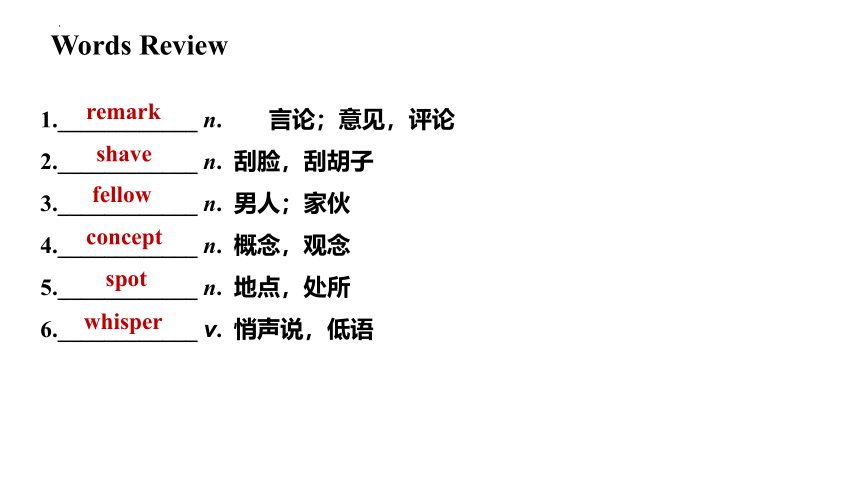


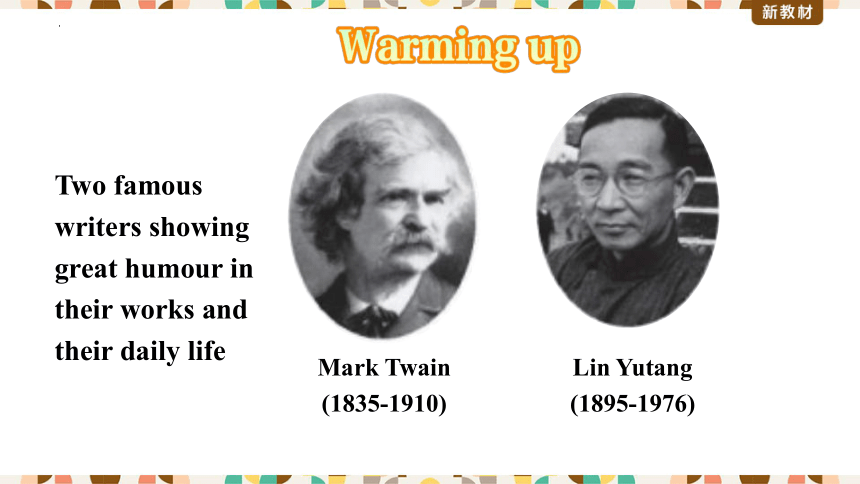
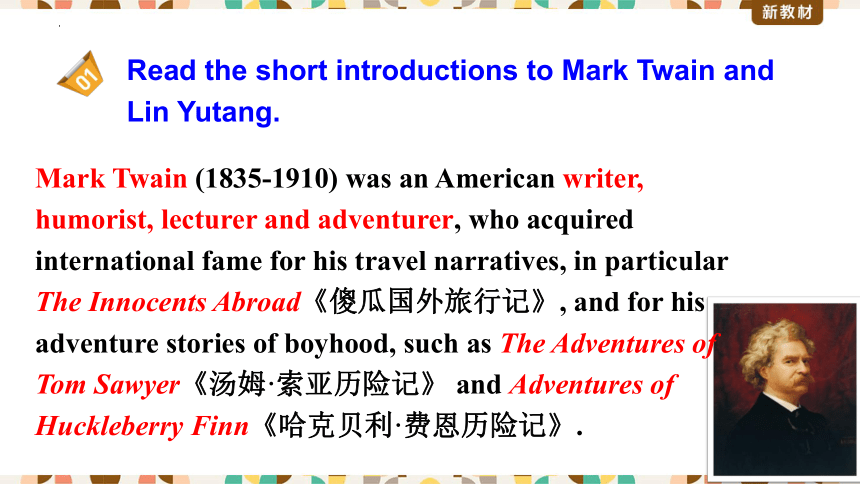
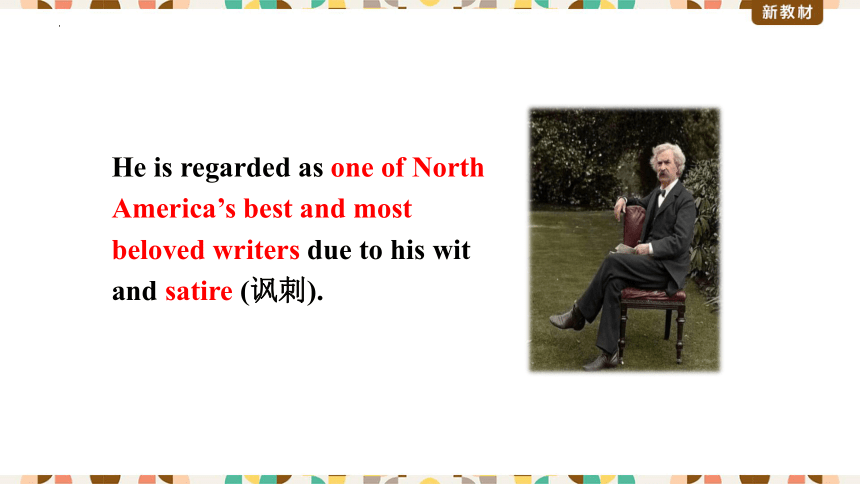
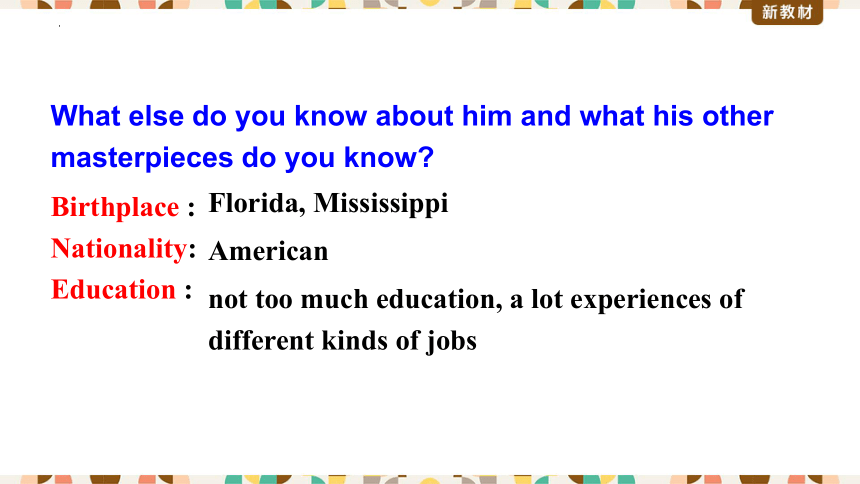
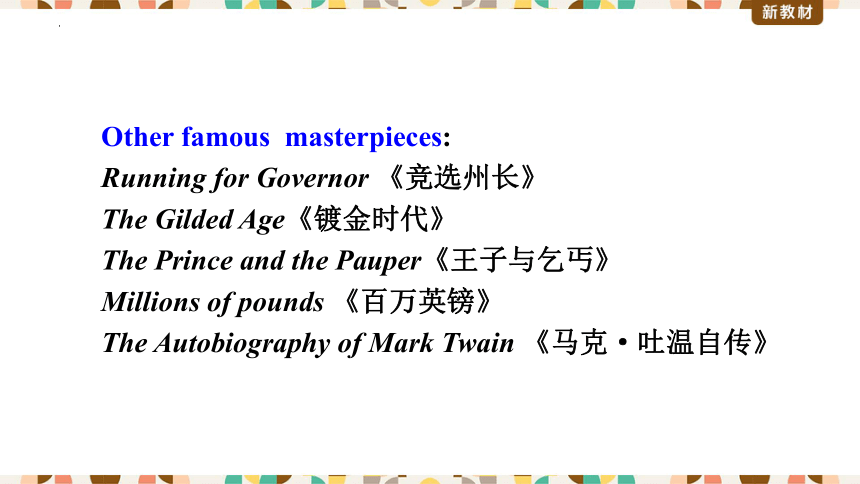
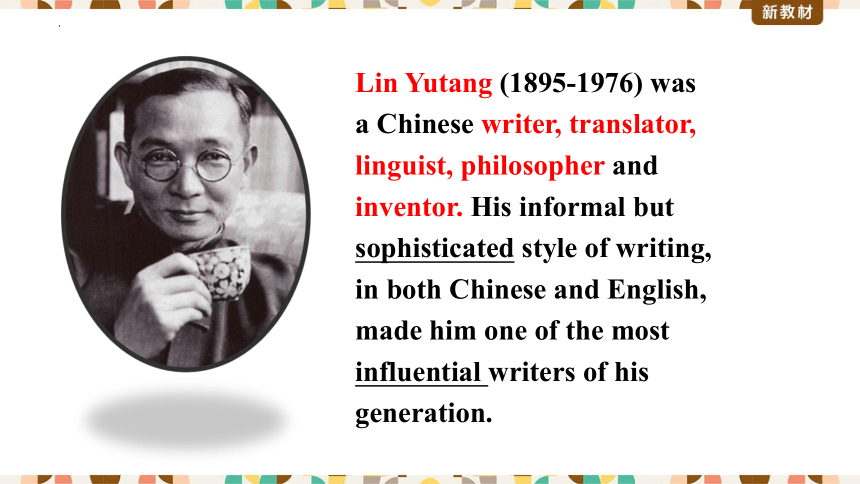
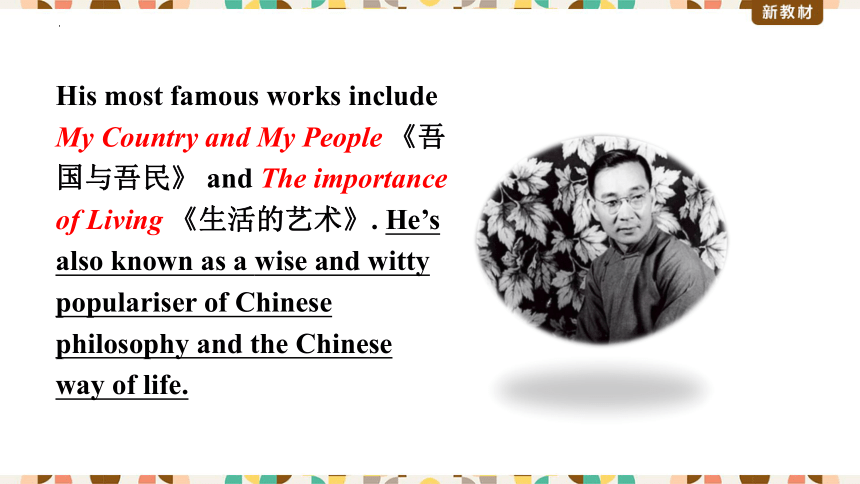
文档简介
(共35张PPT)
Unit 1
Laugh out loud!
1.____________ n. 言论;意见,评论
2.____________ n. 刮脸,刮胡子
3.____________ n. 男人;家伙
4.____________ n. 概念,观念
5.____________ n. 地点,处所
6.____________ v. 悄声说,低语
remark
shave
fellow
concept
spot
whisper
Words Review
Words Review
名声,名誉
语言学家
使情绪激动的
调皮的,淘气的
交流
男理发师
品牌,牌子
1.fame n. ______________________
2.linguist n. ______________________
3.witty adj. ______________________
4.medieval adj. ______________________
5.emotive adj. _______________
6.mischievous adj. ______________________
7.interaction n. ______________________
8.barber n. ____________________
9.brand n. ______________________
说话风趣的;妙趣横生的
中世纪的,中古时期的
10.roar v. ________________
11.illuminate v. ________________
12.equation n. ________________
哄笑,大笑
照亮,照明
等式,方程式
Words Review
Mark Twain
(1835-1910)
Lin Yutang
(1895-1976)
Two famous writers showing great humour in their works and their daily life
Read the short introductions to Mark Twain and Lin Yutang.
Mark Twain (1835-1910) was an American writer, humorist, lecturer and adventurer, who acquired international fame for his travel narratives, in particular The Innocents Abroad《傻瓜国外旅行记》, and for his adventure stories of boyhood, such as The Adventures of Tom Sawyer《汤姆·索亚历险记》 and Adventures of Huckleberry Finn《哈克贝利·费恩历险记》.
He is regarded as one of North America’s best and most beloved writers due to his wit and satire (讽刺).
What else do you know about him and what his other masterpieces do you know
Birthplace :
Nationality:
Education :
Florida, Mississippi
American
not too much education, a lot experiences of different kinds of jobs
Other famous masterpieces:
Running for Governor 《竞选州长》
The Gilded Age《镀金时代》
The Prince and the Pauper《王子与乞丐》
Millions of pounds 《百万英镑》
The Autobiography of Mark Twain 《马克·吐温自传》
Lin Yutang (1895-1976) was a Chinese writer, translator, linguist, philosopher and
inventor. His informal but sophisticated style of writing, in both Chinese and English,
made him one of the most influential writers of his generation.
His most famous works include My Country and My People 《吾国与吾民》 and The importance of Living 《生活的艺术》. He’s also known as a wise and witty populariser of Chinese philosophy and the Chinese way of life.
Birthplace :
Nationality:
Education :
Other famous masterpieces:
What else do you know about him and what other masterpieces do you know
Both originally written in English
Longxi, Fujian
Chinese
Master of Arts in Harvard University , Doctor of linguistics in University Leipzig(德国莱比锡大学)
Moment in Peking《京华烟云》
(adapted as TV series twice)
Between Tears and Laughter《啼笑皆非》
一个人如果抱着义务的意识去读书,便不了解读书的艺术。这种具有义务目的的读书法,和一个参议员在演讲之前阅读文件和报告是相同的。这不是读书,而是寻求业务上的报告和消息。
——林语堂
Reading for information
What is the text type (genre) of the passage
A. narrative B. exposition
C. argumentation D. autobiography
to explain, introduce…
to tell a story
to argue/defend
to tell one’s lifetime experiences
What is the structure of the passage
A. P1 B. P1 C. P1 D. P 1
P2
P3
P4
P5
P2
P3
P4
P5
P2
P3
P4
P5
P2
P4
P3
P5
P3
P3
Reading for information
Organization of the passage
Introduction
Title & Para.1
The importance of humour
Body
Para. 2, 3, 4
Giving examples of Mark Twain and Lin Yutang to support the topic
Conclusion
Para.5
Humour is a tool and can be used to illuminate the world.
Read para 1 carefully and answer the question.
Why is humor an essential part of human behavior for thousands of years
throw light on
使…较容易理解
Why was Mark Twain famous in humor
Because his writing style was mischievous.
Because he could explain serious issues with humor.
Because he was the most humorous writer of modern times.
Because he liked to use satire and wit .
Read para 2 carefully and answer the question.
What did Twain’s response to the barber’s question imply
He gave the lecture himself.
He couldn’t get a ticket to every lecture.
He had to stand because of his bad luck
He didn’t like the fellow that lectured.
Read para 2 carefully and answer the question.
Read para 3 carefully and answer the question.
What is the function of paragraph 3 in this text
Introducing Lin Yutang.
Comparing the achievements of the two writers.
Making a transition to another example.
Explaining the origin of “youmo”.
What can we learn about Lin Yutang from the sentence “Thinking
on his feet, Lin started to tell a story about…”
Lin was able to think and react quickly without any preparation.
Lin was good at telling stories on his feet.
Lin liked telling stories in his speech.
Lin had prepared a story in advance.
Read para 4 carefully and answer the question.
think on one’s feet
反应敏捷,反应快
What did Lin Yutang and Mark Twain have in common
They both considered humor as laughter.
They both argued that humor wasn’t as essential as water for us.
C. They both agreed the significance of humor for human beings.
D. They both shared the equation: Reality + Dreams + Humor = Wisdom.
Read para 5 carefully
and answer the question.
Read the passage and find out Mark Twain and Lin’s attitude towards humor.
Mark Twain and Lin’s attitude towards humour is positive/ favourable. And they practiced what they preached.
What is a punch line
A punch concludes a joke and is intended to make people laugh. In a broader sense, a punch line can also refer to the unexpected and funny conclusion of any performance, situation or story.
Punch line:故事或笑话的最后部分点题或抛出笑料等的)妙语,画龙点睛的结尾句
Do you think humor is important
How can a sense of humour help you in your daily life
adapt to the environment better
reduce your negative emotions
deal with the problem in a better way...
How can you develop a sense of humour
learn to observe things happening in our life
see some humorous movies
read interesting stories
share jokes with our friends
be together with people who have a sense of humour
have a positive, light-hearted attitude towards life
essentially adv.
essence n.
behave v. 表现
be filled with 充满
be full of
throw new light on
使...变简单
cast/shed light on 阐明, 曝光
…come to light 曝光,被理解
entertaining adj.
entertainment n.
entertain oneself 自娱自乐
combine ... with ... 把...和...结合起来
combination n. 结合
cross out 删去;划掉
cross road 十字路口
if 是否;如果
whether 是否,后面接not
幽默感
bring, brought,brought
bring ... to... 把...带到...
bring up 抚养
bring out 出版;生产
borrow ... from ... 从...借....
lend ... to... 把...借给...
master 大师;硕士
置于尴尬处境
having been invited…在这里属于非谓语作状语,当非谓语动作明显的先于主句谓语动作时,用非谓语的完成时形式。
spot sb. doing sth. 看到某人正在做某事
be spotted with... 满是……的斑点; 点缀着
on the spot 当场; 在现场; 立即
struggle to one’s feet 挣扎着站起来
rise to one’s feet 站起身来
stand on one’s own feet 独立,自立
随机应变;当机立断
cruelty n. 残忍
cruelly adv. 残忍地
摇头
shake, shook, shaken
全部倒装:动词提到主语前
匆匆离开
in hurry 匆忙
斥责;责怪
blame sb. For doing sth. 因做某事而责备某人
scold sb. For doing sth. 因做某事而斥责某人
生活方式
复杂的
complex;sophisticated
individual adj. 个人的
individual liberty 个人自由
community n. 社区;社团
祷告
幸事
福祉
Unit 1
Laugh out loud!
1.____________ n. 言论;意见,评论
2.____________ n. 刮脸,刮胡子
3.____________ n. 男人;家伙
4.____________ n. 概念,观念
5.____________ n. 地点,处所
6.____________ v. 悄声说,低语
remark
shave
fellow
concept
spot
whisper
Words Review
Words Review
名声,名誉
语言学家
使情绪激动的
调皮的,淘气的
交流
男理发师
品牌,牌子
1.fame n. ______________________
2.linguist n. ______________________
3.witty adj. ______________________
4.medieval adj. ______________________
5.emotive adj. _______________
6.mischievous adj. ______________________
7.interaction n. ______________________
8.barber n. ____________________
9.brand n. ______________________
说话风趣的;妙趣横生的
中世纪的,中古时期的
10.roar v. ________________
11.illuminate v. ________________
12.equation n. ________________
哄笑,大笑
照亮,照明
等式,方程式
Words Review
Mark Twain
(1835-1910)
Lin Yutang
(1895-1976)
Two famous writers showing great humour in their works and their daily life
Read the short introductions to Mark Twain and Lin Yutang.
Mark Twain (1835-1910) was an American writer, humorist, lecturer and adventurer, who acquired international fame for his travel narratives, in particular The Innocents Abroad《傻瓜国外旅行记》, and for his adventure stories of boyhood, such as The Adventures of Tom Sawyer《汤姆·索亚历险记》 and Adventures of Huckleberry Finn《哈克贝利·费恩历险记》.
He is regarded as one of North America’s best and most beloved writers due to his wit and satire (讽刺).
What else do you know about him and what his other masterpieces do you know
Birthplace :
Nationality:
Education :
Florida, Mississippi
American
not too much education, a lot experiences of different kinds of jobs
Other famous masterpieces:
Running for Governor 《竞选州长》
The Gilded Age《镀金时代》
The Prince and the Pauper《王子与乞丐》
Millions of pounds 《百万英镑》
The Autobiography of Mark Twain 《马克·吐温自传》
Lin Yutang (1895-1976) was a Chinese writer, translator, linguist, philosopher and
inventor. His informal but sophisticated style of writing, in both Chinese and English,
made him one of the most influential writers of his generation.
His most famous works include My Country and My People 《吾国与吾民》 and The importance of Living 《生活的艺术》. He’s also known as a wise and witty populariser of Chinese philosophy and the Chinese way of life.
Birthplace :
Nationality:
Education :
Other famous masterpieces:
What else do you know about him and what other masterpieces do you know
Both originally written in English
Longxi, Fujian
Chinese
Master of Arts in Harvard University , Doctor of linguistics in University Leipzig(德国莱比锡大学)
Moment in Peking《京华烟云》
(adapted as TV series twice)
Between Tears and Laughter《啼笑皆非》
一个人如果抱着义务的意识去读书,便不了解读书的艺术。这种具有义务目的的读书法,和一个参议员在演讲之前阅读文件和报告是相同的。这不是读书,而是寻求业务上的报告和消息。
——林语堂
Reading for information
What is the text type (genre) of the passage
A. narrative B. exposition
C. argumentation D. autobiography
to explain, introduce…
to tell a story
to argue/defend
to tell one’s lifetime experiences
What is the structure of the passage
A. P1 B. P1 C. P1 D. P 1
P2
P3
P4
P5
P2
P3
P4
P5
P2
P3
P4
P5
P2
P4
P3
P5
P3
P3
Reading for information
Organization of the passage
Introduction
Title & Para.1
The importance of humour
Body
Para. 2, 3, 4
Giving examples of Mark Twain and Lin Yutang to support the topic
Conclusion
Para.5
Humour is a tool and can be used to illuminate the world.
Read para 1 carefully and answer the question.
Why is humor an essential part of human behavior for thousands of years
throw light on
使…较容易理解
Why was Mark Twain famous in humor
Because his writing style was mischievous.
Because he could explain serious issues with humor.
Because he was the most humorous writer of modern times.
Because he liked to use satire and wit .
Read para 2 carefully and answer the question.
What did Twain’s response to the barber’s question imply
He gave the lecture himself.
He couldn’t get a ticket to every lecture.
He had to stand because of his bad luck
He didn’t like the fellow that lectured.
Read para 2 carefully and answer the question.
Read para 3 carefully and answer the question.
What is the function of paragraph 3 in this text
Introducing Lin Yutang.
Comparing the achievements of the two writers.
Making a transition to another example.
Explaining the origin of “youmo”.
What can we learn about Lin Yutang from the sentence “Thinking
on his feet, Lin started to tell a story about…”
Lin was able to think and react quickly without any preparation.
Lin was good at telling stories on his feet.
Lin liked telling stories in his speech.
Lin had prepared a story in advance.
Read para 4 carefully and answer the question.
think on one’s feet
反应敏捷,反应快
What did Lin Yutang and Mark Twain have in common
They both considered humor as laughter.
They both argued that humor wasn’t as essential as water for us.
C. They both agreed the significance of humor for human beings.
D. They both shared the equation: Reality + Dreams + Humor = Wisdom.
Read para 5 carefully
and answer the question.
Read the passage and find out Mark Twain and Lin’s attitude towards humor.
Mark Twain and Lin’s attitude towards humour is positive/ favourable. And they practiced what they preached.
What is a punch line
A punch concludes a joke and is intended to make people laugh. In a broader sense, a punch line can also refer to the unexpected and funny conclusion of any performance, situation or story.
Punch line:故事或笑话的最后部分点题或抛出笑料等的)妙语,画龙点睛的结尾句
Do you think humor is important
How can a sense of humour help you in your daily life
adapt to the environment better
reduce your negative emotions
deal with the problem in a better way...
How can you develop a sense of humour
learn to observe things happening in our life
see some humorous movies
read interesting stories
share jokes with our friends
be together with people who have a sense of humour
have a positive, light-hearted attitude towards life
essentially adv.
essence n.
behave v. 表现
be filled with 充满
be full of
throw new light on
使...变简单
cast/shed light on 阐明, 曝光
…come to light 曝光,被理解
entertaining adj.
entertainment n.
entertain oneself 自娱自乐
combine ... with ... 把...和...结合起来
combination n. 结合
cross out 删去;划掉
cross road 十字路口
if 是否;如果
whether 是否,后面接not
幽默感
bring, brought,brought
bring ... to... 把...带到...
bring up 抚养
bring out 出版;生产
borrow ... from ... 从...借....
lend ... to... 把...借给...
master 大师;硕士
置于尴尬处境
having been invited…在这里属于非谓语作状语,当非谓语动作明显的先于主句谓语动作时,用非谓语的完成时形式。
spot sb. doing sth. 看到某人正在做某事
be spotted with... 满是……的斑点; 点缀着
on the spot 当场; 在现场; 立即
struggle to one’s feet 挣扎着站起来
rise to one’s feet 站起身来
stand on one’s own feet 独立,自立
随机应变;当机立断
cruelty n. 残忍
cruelly adv. 残忍地
摇头
shake, shook, shaken
全部倒装:动词提到主语前
匆匆离开
in hurry 匆忙
斥责;责怪
blame sb. For doing sth. 因做某事而责备某人
scold sb. For doing sth. 因做某事而斥责某人
生活方式
复杂的
complex;sophisticated
individual adj. 个人的
individual liberty 个人自由
community n. 社区;社团
祷告
幸事
福祉
